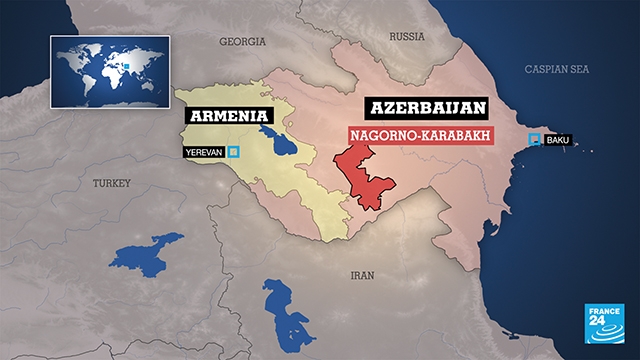Russia is Re-assessing its Position on Nagorno-Karabakh
Analysis
Russia has been dominant in the South Caucasus, and has served as a security guarantor for its CSTO ally, Armenia. However, with Baku’s recent military success against Armenian forces, Moscow faces a major challenge. Though not a member of any Kremlin-led CSTO or the EEU, Azerbaijan has traditionally enjoyed exemplary relations with its northern neighbor, and Russia has to look at wider geopolitical trends too. which favor Azerbaijan rather than Armenia.
Russia’s traditional approach to maintaining the post-1994 balance between the two South Caucasus rivals can no longer be sustained, as Azerbaijan has raced far ahead in terms of purchasing high-tech weaponry from Turkey and Israel, as well as managing to contain even a slight chance of international recognition of NK’s independence.
Trying to stick to the previous equilibrium would drive Baku further from Moscow’s orbit to Ankara, Azerbaijan’s strategic partner. To prevent this scenario, Moscow would most likely choose to approve Baku's restoration of control over as many territories as possible.
This would also complicate Russia's position within Armenia. True, that legally Russia is not obliged to help Armenia, as the war is outside the international borders of Armenia. Many in Yerevan, however, believe Moscow should have aided. It was also suggested that the reason for the Russian reticence could lie in Moscow’s antipathy towards Armenia’s reformist PM Nikol Pashinyan, who came to power in 2018 following the Velvet Revolution, and who has even tried to foster deeper ties with the West.
If Armenian control over Nagorno-Karabakh is lost, resentment in Yerevan towards Moscow could spiral into an open anti-Russian mood. In the long-run, this is bound to cause a major headache for Russia. But for the moment, the policy of sticking to the victorious Azerbaijan, if properly navigated, could bring geopolitical results for the Kremlin. After all, Russia has its position in Armenia solidified and the latter would have little room for geopolitical maneuvering without a major foreign policy reconsideration towards Turkey and Azerbaijan, an unlikely scenario.
This scenario would test the long-held and presumably incorrect assumption that Moscow has been unwilling to allow Azerbaijan to make major territorial gains, for fear of losing Armenia. On the contrary, Baku’s success actually provides Moscow with some opportunities. A victorious Baku would be grateful. Russia could use the opportunity to re-engage Azerbaijan into looking more seriously at EEU membership prospects, or even a deeper cooperation with the CSTO.
But Moscow also fears that as the fighting now spreads deep into the heavily-populated parts of the enclave, allowing Azerbaijan to retake all the Armenia-held territories could eventually evaporate much of the traditional geopolitical leverage Moscow still possesses to influence Baku. As argued, potential cooperation within the EEU and CSTO could follow, but in the longer run, a reunified Azerbaijan could end up pursuing the existing independent foreign policy more robustly, much to Russia’s detriment.
To leave a small lacuna for keeping direct Russian influence on Azerbaijan, one possibility could be dispatching a Russian peacekeeping mission. As recent statements by Armenian officials and Karabakh leaders indicate, Yerevan is slowly moving towards embracing the idea, while Baku as an advancing power still avoids vouching for it. Nevertheless, it is likely that Russia will push further for this initiative.
Russia's options are also limited due to another important element of the NK war: Turkey. The latter’s growing military posture, its quest to be present at the negotiating table, and the ambition to anchor firmly on the Caspian Sea, upends the delicate balance pursued by Russia. Moscow has signaled that the Minsk Group format for negotiating the conflict resolution should be kept in place, signifying its unwillingness to give up a brokering role in the conflict. But to keep Turkey at bay continually, however, Russia will have to make sure that Azerbaijan is paid for its military success: as argued, most likely by returning at least some of the territories. Then, the Azerbaijani president, Ilham Aliyev, might be less pushy for the inclusion of Turkey in the negotiations process, an intention he has stated several times already.
The strong Azerbaijan-Turkey link is upending the post-Cold War geopolitics in the South Caucasus. Russia sees its limits and tries to navigate among its options, which seem less and less attractive unless the Russian leadership opts for major military involvement.
Emil Avdaliani (Twitter – @emilavdaliani) is a non-resident fellow at the Georgian think tank, Geocase, and teaches history and international relations at Tbilisi State University and European University.
By Emil Avdaliani
Image source: france24.com












